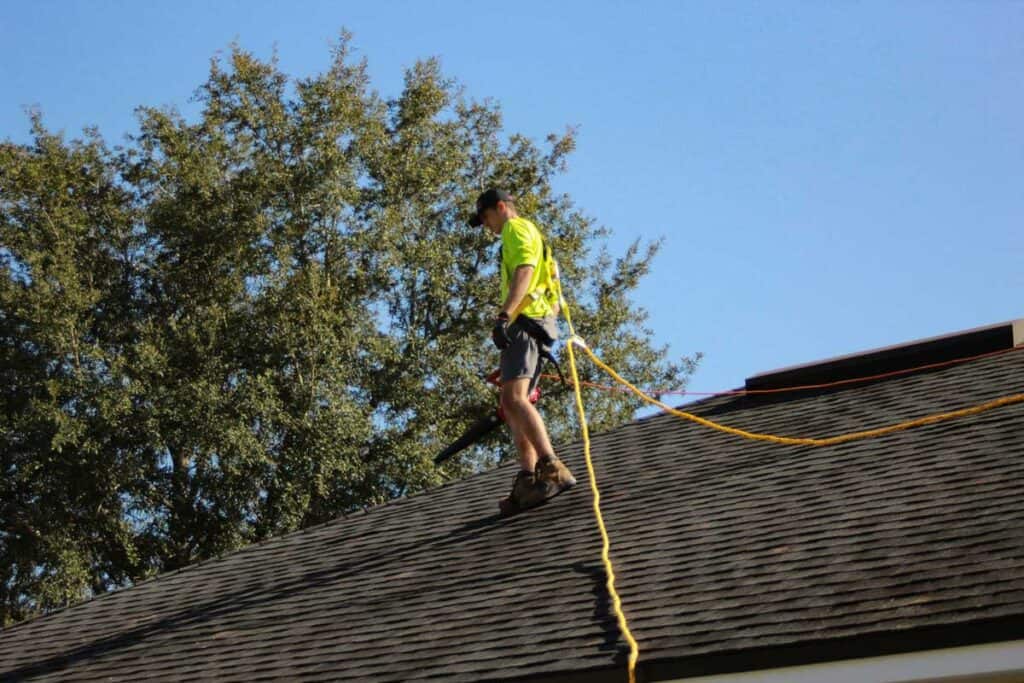When you think about your roof or any details regarding the impact-resistant roof, do you picture it simply as a protective cover over your head? Well, it is, but it’s much more than that! Your roof is the unsung hero of your home, battling severe weather, keeping you dry, and—yes—potentially saving you money on insurance premiums. That’s why it’s so important to know if your roof is equipped with Class 4 impact-resistant shingles. Not only do they offer superior protection against hail and storms, but they can also make a big difference when lowering your homeowner’s insurance costs.
Now, you might wonder: “How do I know if my roof is Class 4-rated?” Don’t worry, it’s easier than you think! In this post, we’ll walk you through the steps to identify whether your roof is made of Class 4 shingles, offer tips for finding necessary paperwork, and help you determine if your concrete tile roof qualifies.
Step-by-Step Guide: How to Verify If Your Roof is Class 4
Before you grab a ladder and start scaling your roof like a professional (which we highly don’t recommend unless you’re a roofing pro), let’s take it slow and follow a logical process to determine if your roof is Class 4 Impact-Resistant roofs are designed to withstand hail damage.
Step 1: Check for Any Available Paperwork or Documentation
One of the easiest ways to confirm the materials on your roof is to check for any paperwork related to the installation. If a contractor replaced or installed your roof, there’s a good chance they provided you with some documentation. Look for the following:
- Contract/Invoice: Often, roofing companies will list the brand of the impact-resistant roofing materials that can affect your home insurance rates, type, and sometimes the rating of the shingles used. If you still have the paperwork, check for any mention of Class 4 materials.
- Manufacturer Information: The roofing contract might also list the manufacturer of the shingles or tiles. If you can’t find any information about the rating directly on the paperwork, knowing the brand will help you look it up.
- A Roofing Permit is essential for installing an impact-resistant roof: Sometimes, roofing contractors will include the roofing material’s specifications on your permit when applying for city or county approval. If you have a copy of your roof replacement permit, take a look—some cities and counties even require contractors to list specific product brands on the paperwork.
If you’re unsure where to find your permit, call your local Building Department and request a copy. While some permits won’t include detailed material specifications, it’s worth asking!
Step 2: Look for Leftover Shingles or Packaging
What happens to the extra shingles left behind after your roof is installed? If you’re lucky, you may have a few bundles in your garage, shed, or on the side of your home. These leftover shingles are a goldmine for identifying whether you have Class 4-rated shingles.
Here’s what to look for:
- Shingle Bundle: If you still have a bundle of shingles from your roof installation (or if you’ve had work done recently), check the packaging for any brand or product details. Most manufacturers include the shingle name, brand, and sometimes even the impact rating right on the front or side of the package. If you can find these details, you can look up the product online or call us, and we’ll help you verify the Class 4 rating.
- Shingle Info on the Back: If you don’t have a bundle but just want to check an existing shingle, look for the manufacturer’s mark or any product identification on the underside of the shingle that indicates its impact resistance. It’s a bit tricky because shingles typically aren’t labeled as “Class 4” on the shingle itself. But knowing the brand and type can give us a good starting point to track down the exact product info.
Step 3: Inspect Your Concrete Tile Roof
What about concrete tile roofs? They’re incredibly durable, but are they also Class 4 impact-resistant? While concrete tile roofs don’t get the same attention as asphalt shingles, they can still be rated for Class 4.
Here’s how you can check if your concrete tile roof qualifies:
- Look for Manufacturer’s Markings: Much like asphalt shingles, concrete tiles often have markings or stamps on the back. These stamps might include the manufacturer’s name, the model name of the impact-resistant roofing materials, or other identifying information that will help you determine if the tiles meet Class 4 standards.
- Check for Extra Tiles: If a contractor installed your roof, you may have some extra tiles left behind (usually as spares for future repairs). Check the backs of these tiles for any stamps or logos that could help identify the product. If you’re unsure, send us a photo of the markings, and we’ll do our best to look them up for you.
- Tile Age and Rating: Some older concrete tiles may not offer the same resistance to impact as newer options. may no longer meet the impact resistance standards required for a Class 4 rating. Over time, manufacturers discontinue older models, and it’s possible that they were not tested to current standards. If this is the case, we can work with you to assess whether your tiles are still impact-resistant or if it might be time for an upgrade.
Step 4: Call a Roofing Professional
If you’ve gone through the paperwork, inspected the tiles, and still aren’t sure, it might be time to get a roofing pro involved. Many roofing companies, like ours at Denny’s Roofing specializes in class 1 impact resistant shingles and roofing materials, offer to inspect your roof for free or for a small fee and identify whether your shingles or tiles qualify as Class 4.
A roofing professional can provide a thorough inspection, check for signs of wear or impact damage, and give you a definitive answer. If necessary, they can even help you write a Roof Certification Letter to present to your insurance company for potential discounts on home insurance for impact-resistant roofs.

Why Does All of This Matter?
Now that you know how to identify Class 4 roofing shingles, you might be asking, “Why does it matter so much?” Well, for starters, Class 4-rated roofs can significantly reduce your home insurance premiums. can help protect your home from hail storms, other types of severe storms, and high winds. Not only do they hold up better against nature’s forces, but they also provide better resistance to impact. Insurance companies love them for their resistance to impact.
Many insurers offer up to 30% discounts for homeowners with Class 4 roofs. This can translate to serious savings on your annual premiums! So, taking the time to identify your roof’s impact resistance could pay off in the long run—not to mention the peace of mind you’ll have knowing your home is better protected.
Get in Touch with Us at Denny’s Roofing
Don’t worry if you’re still unsure about your roof. We’re here to help! Whether you need assistance having us identify impact-resistant shingles or tiles on your roof or you want a professional to inspect your roof and provide a certification letter, we’ve got you covered.
At Denny’s Roofing, we offer free inspections for asphalt shingles and help with insurance claims if needed. We’re happy to assist with concrete tile roofs for a small fee, depending on the circumstances. Give us a call or shoot us an email, and let’s make sure your roof is as impact-resistant as possible!
Further Inquiries Concerning Impact-Resistant Shingles:
What are impact-resistant shingles and why are they important?
Impact-resistant shingles are specialized roofing materials designed to withstand the impact of debris, such as hail or falling branches. These shingles are crucial for homeowners living in areas prone to severe weather conditions, as they help minimize hail damage and extend the lifespan of your roof. By investing in impact-resistant shingles, you can better protect your home and potentially lower your home insurance premiums.
How can I identify impact-resistant shingles on my roof?
To identify impact-resistant shingles, look for a class 4 impact rating label, which indicates the highest level of impact resistance. These shingles are tested under the UL 2218 standard, where a steel ball is dropped from a specific height to simulate hail impact. Additionally, consult with a reputable roofing contractor who can help you determine if your roof has impact-resistant shingles.
What is the difference between standard asphalt shingles and impact-resistant asphalt shingles?
Standard asphalt shingles are designed for general weather conditions but may not withstand severe impacts. In contrast, impact-resistant asphalt shingles are reinforced with materials like polymers or rubber to enhance their resistance to impact. This makes them more durable and capable of withstanding hail and other debris.
What does a class 4 impact rating mean?
A class 4 impact rating is the highest rating given to roofing shingles under the UL 2218 standard. It signifies that the shingles have passed rigorous testing and are designed to withstand severe impacts, such as those from large hail. Class 4 shingles are highly recommended for areas with frequent severe weather.

